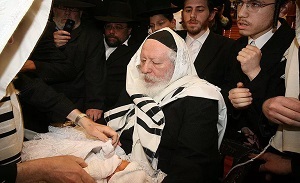Brit Milah
 Brit milah, which means "covenant of circumcision," is a Jewish ritual performed on a baby boy eight days after he is born. It involves the removal of the foreskin from the penis by a mohel, who is a person trained to safely perform the procedure.
Brit milah, which means "covenant of circumcision," is a Jewish ritual performed on a baby boy eight days after he is born. It involves the removal of the foreskin from the penis by a mohel, who is a person trained to safely perform the procedure.
Brit milah is also known by the Yiddish word "bris." It is one of the most well-known Jewish customs and signifies the unique relationship between a Jewish boy and God. Traditionally, a baby boy is named after his bris.
The Ceremony
The ceremony of brit milah takes place on the eighth day of a baby boy’s life, even if that day falls on Shabbat or a holiday, including Yom Kippur. The only reason the ritual would not be performed is if the child is ill or too weak to safely undergo the procedure.
Typically a bris will be held in the morning because Jewish tradition says that one should be eager to perform a mitzvah (as opposed to leaving it until later in the day). However, it can take place anytime before sundown. In terms of venue, the parents' home is the most common location, but a synagogue or another location is also fine.
A minyan is not required for a bris. The only people who are required to be present are the father, mohel and a sandek, who is the person who holds the baby while the circumcision is performed. Brit Milah is composed of three main parts. They are:
- Blessing and Circumcision
- Kiddush & Naming
- Seudat Mitzvah
Blessing and Circumcision
The ceremony begins when the mother hands the baby to the Kvatterin (see below, Honored Roles). The child is then brought into the room where the ceremony will take place and is handed to the Kvatter (see below, Honored Roles).
As the baby is brought into the room, it is customary for guests to greet him by saying "Baruch HaBa," which means "Blessed be he who comes" in Hebrew. This greeting was not originally part of the ceremony but was added as if to express a hope that, perhaps, the Messiah had been born and guests were greeting him.
Next, the baby is handed to the Sandek, who is the person that holds the baby while the circumcision is performed. Sometimes the sandek sits in a special chair called the Chair of Elijah. The prophet is thought to be the child's guardian at the circumcision and hence there is a chair in his honor.
The mohel then recites a blessing over the baby, saying: "Praised are you, Adonai our God, King of the Universe, who has sanctified us with Your commandments and commanded us in the ritual of circumcision."
The circumcision is then performed and the father recites a blessing thanking God for bringing the child into the covenant of Abraham: "Blessed are You, Adonai our God, King of the Universe, who has sanctified us with Your commandments and commanded us to make him enter into the covenant of Abraham our father."
After the father has recited the blessing, guests respond with "As he has entered into the covenant, so may he be introduced to the study of Torah, to the wedding canopy, and to good deeds."
Kiddush and Naming
Next, the blessing over the wine (Kiddush) is said and a drop of wine is put into the baby’s mouth. A prayer for his well-being is recited, followed by a longer prayer that gives him his name:
Creator of the universe. May it be Your will to regard and accept this (performance of circumcision), as if I had brought this baby before Your glorious throne. And in Your abundant mercy, through Your holy angels, give a pure and holy heart to ________, the son of ________, who was just now circumcised in honor of Your great Name. May his heart be wide open to comprehend Your holy Law, that he may learn and teach, keep and fulfill Your laws.
Seudat Mitzvah
Finally, there is the seudat mitzvah, which is a celebratory meal that is required by Jewish law. In this way, the joy of a new life in this world is connected with the joy of sharing food with family and friends.
Not counting the seudat mitzvah the entire ceremony of brit milah takes approximately 15 minutes.
Honored Roles
In addition to the mohel, there are three other honored roles during the ceremony:
- Sandek: This is the person who holds the baby while the circumcision is being performed. The sandek is usually a man, often a grandparent, brother or even a close friend of the father.
- Kvatterin: The Jewish equivalent of a “godmother,” before the ceremony begins the Kvatterin takes the baby from the mother and hands him to the Kvatter.
- Kvatter: The Jewish equivalent of a “godfather,” the kvatter takes the baby from the Kvatterin and brings him to the mohel.
By Ariela Pelaia
https://www.learnreligions.com/

